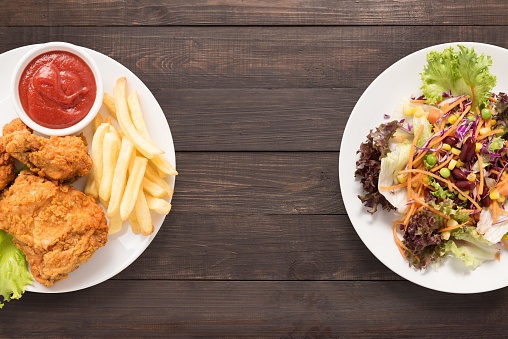OVEREATING? Maybe it's not your willpower!
OVEREATING? Maybe it's not your willpower!
Summertime is a great time to watch your weight when there is a plentiful supply of healthy fruits and vegetables, grilled foods, and active outdoor living. When you succeed at eating healthy foods and avoiding junk, you probably attribute the bulk of your success to your ability to resist unhealthy impulses, the sheer power of your mighty will. Likewise, when your healthy eating disappears, and you start to regain the weight you lost, it’s your inability to exert self-control that takes much of the blame.

That’s the common belief, that willpower is the most important ingredient for life change. Without it, the truism goes, you won’t be able to stay the course during any big transition—whether it’s weight loss, a job hunt or even improving your marriage.
Willpower is just a pejorative way of describing your failures, because willpower really doesn't have any meaning. ''There is no magical stuff inside of you called willpower that should somehow override nature,'' said Dr. James C. Rosen, a professor of psychology at the University of Vermont. ''It's a metaphor that most chronically overweight dieters buy into.
It’s true that self-control is a powerful human tool, and that people with a lot of it are more likely to do better in school and work than those with comparatively little of it. But when it comes to weight loss (and gain), willpower is not actually all that powerful, argues University of Minnesota health psychologist Traci Mann in her new book, Secrets From the Eating Lab: The Science of Weight Loss, the Myth of Willpower, and Why You Should Never Diet Again.
“The myth is that people who are fat have bad or weak willpower, and people who are thin have good willpower, and that’s why they’re thin,” said Mann. “The myth is that you can get thin if you have strong willpower, and you can’t get thin if you have less willpower. Basically, willpower is the thing everyone blames — it’s the first thing people think of and the first thing people toss at dieters when the weight comes back on.”
We have this widespread perception that obesity is the cause of lack of willpower and personal control, the belief that overweight people are lazy or unable to control themselves. That is an oversimplification. It’s a much more complex condition and it has much more to do with human biology than personal willpower. It’s much more about the complex interaction of brain chemicals, behavioral conditioning, hormones, heredity and the powerful influence of habits.
The big flaw in the self-control idea is this: You can actually run out of willpower. Yes, willpower is a depletable resource. (There’s a great book that explains the science behind this, Willpower: Rediscovering the Greatest Human Strength by Roy F. Baumeister and John Tierney.) Your brain uses glucose as energy. Whether you’re declining dessert, pushing yourself to stay late at work, or making yourself go to the gym, controlling your behavior draws on your brain’s limited store of glucose and your body can literally run dry. Baumeister and Tierney call this condition “ego depletion,” meaning that as you use up glucose, your ability to control your thoughts, feelings and actions weakens. Because willpower relies on glucose energy, running on empty will leave you susceptible to temptation and flat-out bad decisions.
When we rely solely on the depletable resource of willpower we set ourselves up to fail. Instead of looking at weight loss as a win-lose proposition that forces us to expend willpower energy on denying ourselves, we can start thinking about nutrition as having the power to make choices. Once we move into choice mode, we set ourselves up to succeed. What’s even cooler is that we can use this strategy to reach any goal we’d like, whether it be physical, financial or personal. And no willpower needed! Making choices takes the issue of deprivation and self-control right off the table. When you make a decision to have a healthy body and peace of mind around food, you make a mental shift away from judgment and blame and towards positive action.
It is important for dieters to keep in mind the formidable forces working against them and their so-called willpower. We live in about the most toxic environment for weight control that you can imagine. There is ready, easy availability of high-fat, high-calorie fast foods that are relatively affordable, combined with the fact that our society has become about as sedentary as a society can be. Such temptations can be intolerable for even the most dedicated.
A better way to think about willpower in terms of eating is to arrange your life so that you don’t need any of it. Researchers like Cornell University’s Brian Wansink have uncovered some clever ways to reconfigure your environment so that you end up eating less without thinking about it: for example, things like using smaller plates, or refraining from eating directly out of the box or package, are easy to do and have been shown to be effective in helping to curb mindless overeating.
Behavior modification is now the most widely accepted approach to long-term weight loss. Practically, that means changing eating habits -- and making new habits -- by performing new behaviors. Most programs now recommend things like pausing before eating to write down what is about to be eaten, keeping a journal describing a mood just before eating and eating before a trip to the grocery store. These are some of the strategies that the “It’s Easy Eating!” 12 Week Program by Judi Samuels utilizes to support weight management.

Taking a more positive attitude about your ability to lose weight involves these very practical steps in changing your behavior and many more. The next time you are challenged with a difficult food choice, here’s how to respond:
“I can have it, but I don’t want it” vs. the old school diet mentality that says “I want it, but I can’t have it.” For more info and help with healthy eating, talk to one of our fitness professionals!
Like what you see here, subscribe to our blog or follow us on social media!
@OnelifeFitness #OnelifeFitLife

